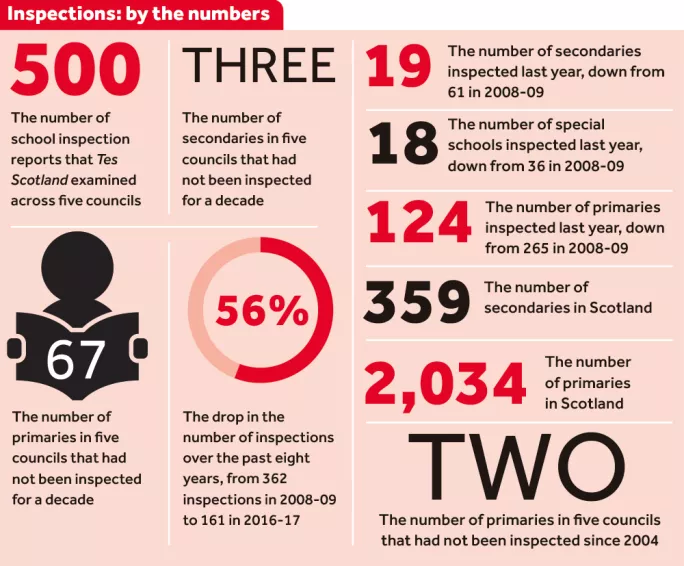An inspector calls ... but only once every 10 years

A significant number of Scottish schools are going a decade or more without being inspected - and some schools have not had an inspector call since 2004, a Tes Scotland investigation reveals.
Critics of the inspection process have suggested that inspection reports are irrelevant after five years and that high-performing schools could even take legal action if they felt their reputation was tainted by an outdated report from another era.
However, Education Scotland pointed out that local authorities and the schools themselves were also responsible for maintaining standards between inspection reports.
Tes Scotland looked at the last time inspection reports were published for over 500 primaries and secondaries in a diverse range of councils: Glasgow, Falkirk, Highland, Moray and Shetland. There are 2,034 primaries and 359 secondaries in Scotland in total.
Overall, the figures for the five councils show that 15 per cent of primaries had not had an inspection report published for a decade or more (67 out of 436). Three secondaries had not been inspected for a decade - St Paul’s High in Glasgow, and Mallaig High and Dingwall Academy in Highland.
The school that had not been inspected for the longest was Canna Primary in Highland, which had an inspection report dating back to 2002. The school was mothballed for three years until it reopened in 2014, when two families moved to the National Trust-owned island.

Two schools had inspection reports dating back to 2004: Whiteinch Primary in Glasgow and Staffin Primary in Highland. Back then, US president Donald Trump was a new reality TV star, Facebook had only just been founded and the inspectorate was still seven years away from merging with Learning and Teaching Scotland.
Overall, the frequency of inspection has dropped by more than 50 per cent, from 362 inspections in 2008-09 to 161 in 2016-17. Last year, just 19 secondaries were inspected, while in 2008-09 some 61 secondaries were inspected.
Tes Scotland also looked at all the 300-plus primaries and secondaries inspected in 2008-09 and found that, eight years on, none of them had undergone a full inspection since - although for the schools that had continued to engage with Education Scotland more recent follow-up reports were available.
Conservative shadow education secretary Liz Smith said the frequency of inspection was “a serious concern”.
She added: “In some cases pupils could go right through their school career without any inspection taking place. I’m sure parents will find that unacceptable.”
Responding to the Tes Scotland findings, Keir Bloomer - education committee convener at Scotland’s national academy of science and letters, the Royal Society of Edinburgh - called for the role of the inspectorate to be reviewed. When the inspectorate was set up over 100 years ago its purpose was clear but inspections are now “too infrequent to fulfil that role satisfactorily”, he said.
He called for Education Scotland - which has also been criticised for over-inspection in recent times - to remove any reports more than five years old from its website, saying that the information could be “actively misleading”; this call was echoed by primary school leaders’ body the AHDS.
Threat of court action
Mr Bloomer, who is also a former director of education, suggested that “a much-improved school with an outdated, damning report” could take Education Scotland to court to have the report taken down.
“The time has probably come to conduct a serious review - that is, a serious research and evidence-based investigation, not a trivial consultation - into whether this particular 19th-century mechanism has a useful future role and what that role might be,” he said.
Greg Dempster, general secretary of AHDS, said many inspection reports painted an “artificial picture” of a school because they captured “a moment in time” and quickly dated.
He agreed that reports should be taken down after around five years. However, more frequent inspection was not the answer, he argued. “We want a system of inspection that is focused on the local authority level and how well they know their schools and their ability to support their schools’ development because they are the ones in and out of schools all the time supporting, directing and encouraging them,” said Mr Dempster.
An Education Scotland spokeswoman said that, in Scotland, there is a three-level approach to evaluating and improving education. Schools have a responsibility to evaluate their performance, local authorities have statutory duties around quality improvement and reporting, and the third level is inspection.
She said that schools were inspected on “a proportionate basis and not on a cyclical basis” and that schools were selected for inspection based on a representative sample, or on risk.
She added: “The Scottish new standards and evaluation framework as specified within the National Improvement Framework and Improvement Plan will set expectations on the focus and frequency of school inspection carried out by Education Scotland in future.”
You need a Tes subscription to read this article
Subscribe now to read this article and get other subscriber-only content:
- Unlimited access to all Tes magazine content
- Exclusive subscriber-only stories
- Award-winning email newsletters
Already a subscriber? Log in
You need a subscription to read this article
Subscribe now to read this article and get other subscriber-only content, including:
- Unlimited access to all Tes magazine content
- Exclusive subscriber-only stories
- Award-winning email newsletters